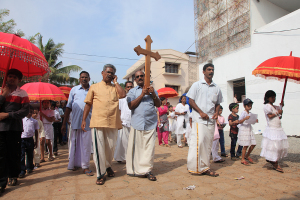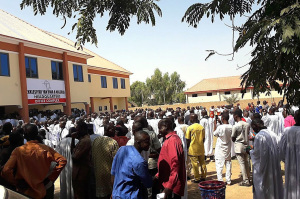China's Plan to Eradicate House Churches Sees Dramatic Increase in Persecution

China's Christians felt a noticeable rise in persecution in 2012 as the Communist government began the first of a three-phase plan to eradicate unregistered house churches, a new report says.
Cases of persecution of Christians rose by about 42 percent last year compared with 2011, according to the report by human rights group China Aid. With the number of persecuted Christians rising by roughly 14 percent and detentions by nearly 12 percent, overall persecution was about 13 percent worse than in 2011 – though China Aid termed its statistics just "the tip of the iceberg."
At least 132 cases of persecution affecting 4,919 Christians – 442 of whom were clergy – were reported in the country last year, according to China Aid's annual report. The Texas-based group tracked detention of at least 1,441 Christians, the sentencing of nine of them, and the abuse – verbal, mental and physical, including beatings and torture – of 37 Christians.
Beijing, administered directly under the central government, witnessed the highest number of persecution cases, at 62, affecting 934 Christians; Xinjiang Uyghur Autonomous Region in northwest China followed with at 11 cases involving 382 Christians. Persecution was also high in central China – comprising Henan and Hubei Hunan provinces – where 1,056 Christians were affected, and in east China, which includes Shandong, Anhui, Zhejiang, Jiangsu and Jiangxi provinces, which witnessed harassment of 750 Christians.
The report also notes that persecution last year was 61 percent worse than in 2010; 85 percent worse than in 2009; 120 percent worse than in 2008; 308 percent worse than in 2007; and 372 percent worse than in 2006.
Ending Unregistered House Churches
The recent appointment of Xi Jinping as the new leader of China's Communist Party has made no difference in treatment of Christians, said a member of the Shouwang Church in Beijing, a congregation authorities have harassed for more than two years.
"I recently went to see the founding pastor, Jin Tianming, and his wife [under house arrest sinceApril 2011] in their rented apartment in west Beijing," the source told Morning Star News. "I was not allowed to enter their home, and the pastor was not allowed to go outside. We chatted for a while at their home's doorway, as two plainclothes police officers watched."
Pastor Tianming was granted the right to do his workout outside his apartment every afternoon from November 2011 to early January this year. But since he attended a Shouwang weekly evening prayer meeting in the rented facility of Xinshu (New Tree) Church, a sister congregation of Shouwang, after jogging on the afternoon on Jan. 9, Tianming has not been allowed to leave his home.
The continued rise of persecution is not the only dynamic raising serious concerns; authorities have targeted unregistered house churches in a planned manner, according to the report. In 2008 and 2009, officials "targeted house church leaders and churches in urban areas," China Aid notes. In 2010, they "attacked Christian human rights lawyers groups and using abuse, torture and mafia tactics." The focus in 2011 was on increasing the intensity of attacks against Christians and house churches.
In 2012, a new three-phase approach was adopted to wipe out unregistered house churches, which the government saw as a hostile group of dissenters, and force them to join the official Three-Self Patriotic Movement (TSPM) church system. In the first phase, from January 2012 to June, the State Administration for Religious Affairs (SARA) secretly investigated house churches across the country and created files on them, the report says. This was followed by a wave of crackdowns on house churches, which has continued into 2013, as part of the second phase. The second phase will also entail strongly encouraging unregistered churches to become part of the TSPM – at which point they would become known as "house gatherings," with the government banning the term "house churches."
Some house churches have registered with authorities to avoid arrests and harassment, but most do not as they object to TSPM beliefs and controls. Barriers to evangelical churches registering with the TSPM include theological differences, adverse consequences if they reveal names and addresses of church leaders or members, and government control of sermon content.
The number of Protestant house-church Christians has been estimated at between 45 million and 60 million.
The third phase is expected to begin from 2015 through to 2025, when the government would shut down house churches that do not comply with the requirement to join the TSPM, according to a joint-memo issued in September 2011 by SARA and the ministries of public security and civil affairs, the report says.
With this objective in mind, authorities in 2012 stepped up long-time tactics of banning and sealing churches, pressuring churches to join the official Three-Self structure, detaining church leaders and sending them to labor camps on the pretext of "suspicion of organizing and using a cult to undermine law enforcement," and strictly restricting the spread of the Christian faith among students, the report points out.
China Aid cites Shouwang Church as an example of closures by authorities.
"Landlords were pressured to terminate lease agreements with church members, church members who had purchased real estate were unable to take possession of them, church leaders were placed under house arrest and church members were evicted – all of which was done to make it impossible for the house church to operate normally so that it would eventually disband," the report notes.
Last September, Shouwang Church leaders said members were detained 1,600 times, 60 members were evicted from their homes, and more than 10 lost their jobs because they attended the church's outdoor worship services or simply because they were members. Many others were sent back to their hometowns, and some were confined to their homes on the weekends.
In February 2012, two Christians in Yulin, Shaanxi Province, were sent to a labor camp on charges of being a cult. In April, seven leaders of a house church in Pingdingshan, Henan province, were arrested and tried on this charge. In August, nine Christians from Ulanhot, Inner Mongolia, were placed under administrative detention for engaging in evangelism while providing free medical services, and two of them were sentenced to two years of re-education-through-labor.
Many summer camps for Christian students were raided, and the crackdowns were severe last year, the report adds.
Just as the Bible warns, "It is hard for you to kick against the goads," the approach of the Chinese government is "ignorant," concludes China Aid President Bob Fu in the report. "House churches will not be eradicated. What will be eradicated are any ideology and forces that try to resist the truth of Christ."





























